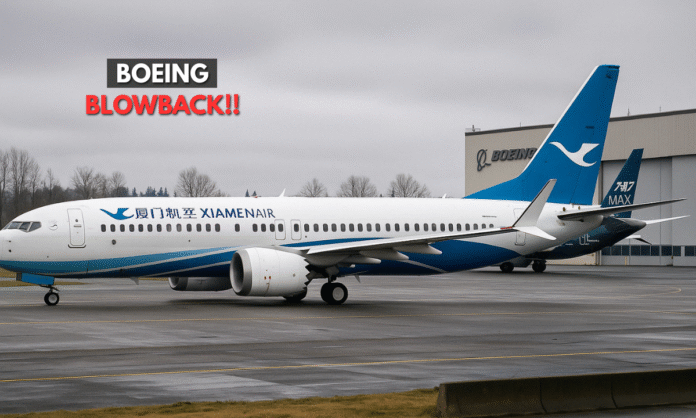SUMMARY
- Chinese airlines suspend Boeing 737 MAX deliveries amid U.S. tariffs; at least three jets rerouted back to Seattle.
- The move follows Beijing’s response to Washington’s 145% import tariff on Chinese goods, reigniting trade tensions.
- Boeing’s recent recovery in China jeopardized, with major orders from Air China, China Eastern, and China Southern now under review.
Boeing’s China Reset Crashes Again as Trade War Reignites
The U.S.–China trade war has delivered another blow to global aviation, as Chinese airlines begin rejecting Boeing aircraft deliveries and returning jets already prepared for handover. Over the weekend, a Boeing 737 MAX 8 aircraft bearing Xiamen Airlines livery landed in Seattle, marking a dramatic reversal for the American aerospace giant just months into its recovery in China.
The move came shortly after the Chinese government reportedly directed local carriers to suspend Boeing deliveries, a direct response to the 145% import tariff imposed by the U.S. on Chinese goods earlier this month. While China’s Foreign Ministry denies issuing a formal directive, sources confirm at least three aircraft were rerouted from Boeing’s Zhoushan delivery center—a joint venture specifically built to serve Chinese customers.
🇨🇳🇺🇸 ANOTHER BOEING 737 MAX HEADS HOME AS TARIFF WAR HITS TURBULENCE
— Mario Nawfal (@MarioNawfal) April 21, 2025
A second Boeing jet meant for China is flying back to the U.S.—because no one’s paying $55M + 125% in tariffs just to take delivery.
China slapped the tax after Trump jacked tariffs on their imports to 145%,… https://t.co/piYiYi0bhT pic.twitter.com/Im2WB9Og99
Aircraft Rejected, Plans Disrupted: Ripple Effects Hit Lessors and Airlines
- A Chinese leasing firm disclosed that a client airline pulled out of its 737 MAX commitment due to delivery suspension.
- The firm is now trying to remarket the aircraft to non-Chinese carriers.
- Airlines are said to be reassessing delivery schedules to avoid financial entanglement amid trade hostilities.
With Boeing deliveries slowing again, local Chinese airlines are expected to delay or defer further imports, potentially scrambling their fleet planning and international route expansion. The impact goes beyond just aircraft handovers—it hits supply chains, maintenance contracts, and the leasing market, which relies heavily on cross-border deal flow.
One industry source said, “Nobody wants to be caught taking delivery of a multi-million-dollar jet with uncertain tariff consequences.”
What This Means for Boeing’s China Strategy
- In 2025, Boeing had delivered 18 aircraft to 9 Chinese airlines before the freeze.
- Major Chinese carriers still have 179 Boeing jets on order, due for delivery between 2025 and 2027.
- The 737 MAX only resumed deliveries to China in 2023 after a five-year safety suspension following deadly crashes.
After years of diplomatic repair and regulatory adjustments, Boeing had only just begun re-entering China’s competitive aviation market, long dominated by Airbus. Now, Trump’s tariff escalation risks shutting that door again.
Boeing’s Zhoushan delivery center, once a symbol of U.S.-China manufacturing synergy, now sits with undelivered aircraft—and uncertain prospects.
This not only challenges Boeing’s projected growth in Asia but also reduces its ability to compete with Airbus, which currently enjoys far smoother delivery cycles in China due to France’s more neutral trade ties.
Political and Economic Fallout: Washington-Beijing Friction Escalates
- U.S. tariffs on Chinese imports were intended as retaliation for IP violations and trade imbalances, but the aviation sector has become a collateral victim.
- Beijing’s aircraft pushback may lead to counter-pressure on American aviation, tech, and agriculture sectors.
- Chinese media calls the suspension an assertion of sovereignty amid “unjust economic aggression.”
President Xi Jinping, fresh from a Southeast Asia charm offensive, appears to be signaling that China will not absorb U.S. economic blows passively. The timing is critical, as Beijing accelerates domestic aircraft development—including the COMAC C919, billed as a long-term challenger to both Boeing and Airbus.
Meanwhile, President Trump’s economic hardline strategy, intended to rebalance trade, could backfire if Boeing’s largest export markets start to pull back.
The Bigger Picture: Commercial Jets as Trade War Pawns
The halted deliveries, grounded jets, and redirected aircraft are not just logistics blips—they represent the weaponization of global supply chains in a deepening Cold War 2.0. The suspension may trigger:
- Further delays in air travel recovery in China, especially for low-cost carriers reliant on narrow-body jets.
- Ripple effects on Boeing’s U.S.-based production lines, including layoffs or postponed assembly.
- Increased momentum in China’s aviation self-reliance efforts, as confidence in Western suppliers erodes.
As one aviation analyst noted: “When aircraft become leverage in a tariff war, the skies are no longer neutral.”



